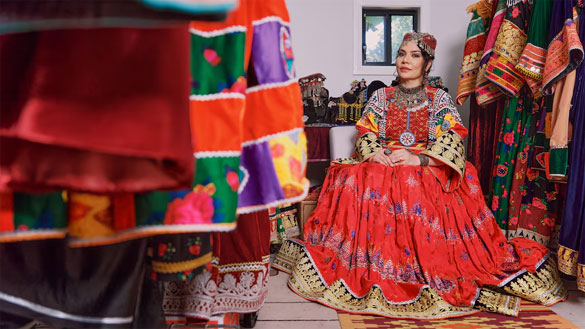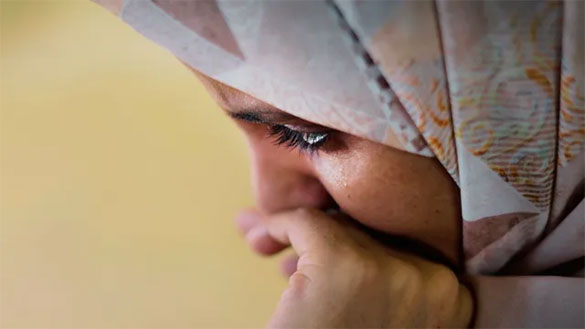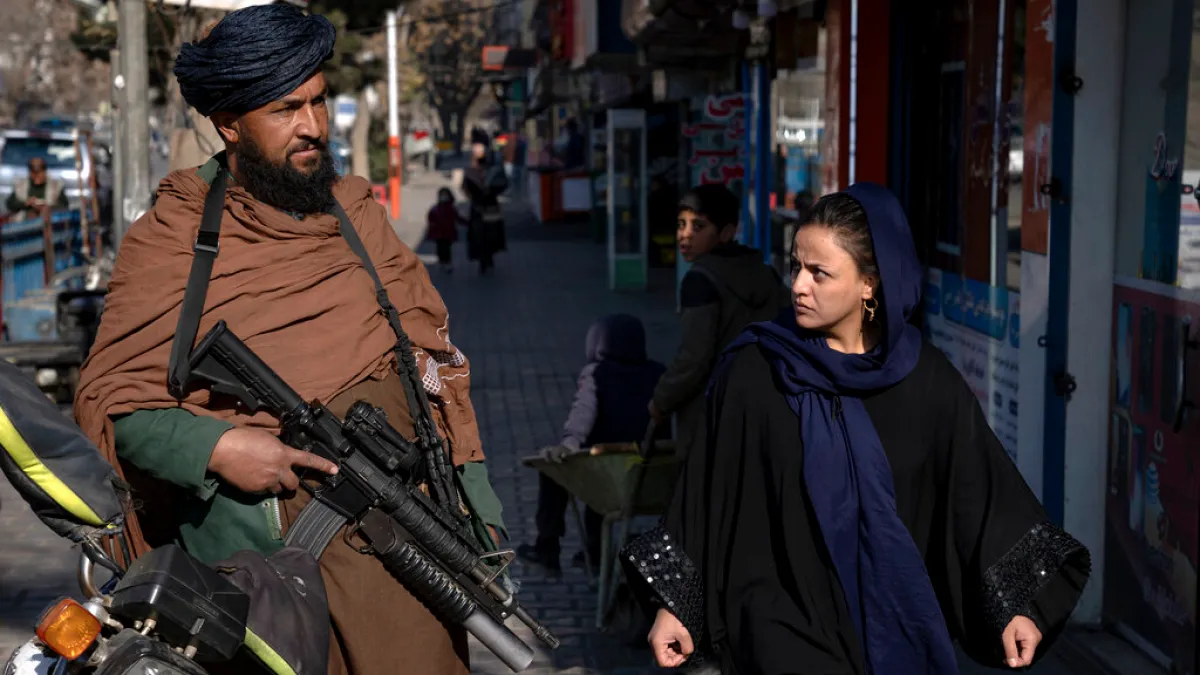- The Taliban Tried To Stop Lida Mangal From Employing Afghan Women
- ‘I Wish I Weren’t A Girl’: 700,000 Women Struggle For Menstrual Hygiene In War-Torn Gaza
- TikTok Murder Sends Chill Through Pakistani Influencers: ‘Every Woman Knows This Fear’
- UN Human Rights Council To Spotlight Rights Of Afghan Women At 59th Session
- Pakistan Names Women’s Squad For AFC Qualifiers Amid Bid To Elevate Football’s Profile
- ‘Pakistan-Born’ Woman Booked In UP’s Bareilly For Procuring Fake Aadhaar, Ration Card
Compiled by New Age Islam News Bureau
URL: https://newageislam.com/islam-women-feminism/taliban-tried-employing-afghan-women/d/135873
—–
The Taliban Tried To Stop Lida Mangal From Employing Afghan Women
By Isabella Ross
15-06-2025

Lida Mangal says her Afghan garment business in Western Sydney is a form of “resistance and representation”. (ABC News: Jack Ailwood)
———
LidaMangal vividly remembers the “golden years” of her childhood in Afghanistan.
Decades on, Ms Mangal has found freedom in Australia — though her country of origin and the “very strong” women who remain there never leave her thoughts.
“I thought how could I provide a means of income to these women? They had experience in tailoring and textiles. Some were widowed or without a male companion … Afghan women deserve freedom.”
Photo shows A woman wearing a blue burqa covering shields her eyes from the sun and camera while she walks in the streetA woman wearing a blue burqa covering shields her eyes from the sun and camera while she walks in the street
Virtue laws introduced by the Taliban ban women from speaking or showing their faces in public as a senior UN official called it an extension of the “already intolerable restrictions” on Afghan women.
That same year, Ms Mangal founded her business, Ghan Fashion, where she brings traditionally designed dresses from Afghanistan to Australia.
Initially, she was able to openly hire women who were still working in Afghan textile factories, but in recent years, the “barbaric regime’s agenda” has made that effort extra difficult.
“I’ve got 20 women who are working now from home, because of the restrictions of the current regime. They have their own materials and equipment they use. I explain my designs … and they prepare and make it,” she said.
A former refugee and now Australian citizen, Ms Mangal works full-time in a separate occupation, as well as running her fashion business from her Western Sydney home.
The garment transportation process is a challenge — the Taliban use sharp tools to check packages for anything being smuggled out of Afghanistan, meaning some of Ms Mangal’s dresses arrive ripped and damaged.
“This new chapter has allowed me to reclaim my voice and write a story that I choose — one filled with hope, ambition and determination.”
Kabul Social is run predominantly by female refugees from Afghanistan, notes Shaun David-Christie (far right). (Supplied: Kabul Social/Kitti Gould)
Kabul Social, founded by Plate It Forward director Shaun Christie-David, is run by a team of predominantly female refugees from Afghanistan, bringing their country’s flavours to Sydney’s CBD.
It was predated by Colombo Social, which has the same intention of celebrating culture and cuisine while employing migrants and refugees.
“What truly humbles me is seeing our refugee workforce and their families thrive, building a legacy of generational change,” Mr Christie-David said.
Mr Christie-David said his aim was to “give people a chance that wouldn’t get one otherwise”, given the challenges of having international qualifications recognised in Australia.
Marjorie Tenchavez is the founder and director of Welcome Merchant, a social enterprise that elevates refugee and people seeking asylum entrepreneurs.
“Often they [refugees] have family members relying on them in their home countries as well. Refugee merchants also don’t have mainstream access to much support, such as borrowing from the banks, given many are on bridging visas.”
“It’s now more important than ever to give them a platform because there has definitely been a waning interest in the refugee space.”
Adama Kamara, deputy chief executive officer of Refugee Council of Australia, said the event was a way to champion the resilient nature of many refugees.
“Refugees are among Australia’s most entrepreneurial newcomers … this incredible drive, often born out of necessity and a desire to contribute, adds significant economic and social value,” she said.
Later this year, the 1 millionth permanent refugee visa will be issued since Australia’s post-war resettlement program began in 1947, according to the Refugee Council.
Source: www.abc.net.au
—–
‘I Wish I Weren’t A Girl’: 700,000 Women Struggle For Menstrual Hygiene In War-Torn Gaza
By Supratik Das
15 Jun 2025

Representational Image | Credit: Reuters
———–
At the centre of an relentless humanitarian crisis in the Gaza Strip, an often overlooked crisis is unfolding with quiet urgency, that is women’s and girls’ menstrual well-being. During Israel’s months-long siege and heavy shelling, close to 700,000 menstruating women and girls are finding it difficult to cope with their periods with dignity and safety. The United Nations Population Fund (UNFPA) has cautioned that lack of access to essential hygiene products, clean water, and safe facilities has converted a normal biological process into a deep humanitarian and public health emergency.
According to UN global data, 1.8 billion people menstruate worldwide, but in conflict areas like Gaza, menstruation becomes far more than a monthly inconvenience, it becomes a human rights concern. In overcrowded displacement shelters and temporary tent camps, girls getting their first period are doing so in unimaginable conditions. They have no sanitary pads, no soap, and no private toilets. “I only had one pad, so I wrapped it in toilet paper to make it last. I couldn’t wash, and the pain was horrible. I sat in silence crying until the end of the day,” a displaced teenage girl told UNFPA. These stories are no longer isolated. Since March, the blockade of humanitarian relief has severely limited the introduction of hygiene material. While a partial suspension of the ban allowed for some relief, distribution of aid which is now organised by channels outside the UN system is still woefully insufficient. Current levels of delivery are far below the colossal demand, with only a small portion of more than 10 million sanitary pads needed monthly reaching Gaza’s displaced persons. “This crisis is not just about hygiene; it is about dignity, health, and the protection of basic human rights. “Food keeps us alive, but pads, soap, and privacy let us live with dignity,” a displaced woman from Khan Younis, said in a UNFPA statement.
With over 90 per cent of the region’s water and sanitation infrastructure destroyed and water pumping fuel out of reach, the hygiene crisis is assuming a deadly dimension. Women are resorting to makeshift substitutes such as worn-out clothing, used cloths, or sponges which are often unclean and unsuitable for prolonged use heightening the threat of urinary tract infections, reproductive disorders, and long-term health impairment. A father of four girl child from Jabalia recounted his sorrow, “I ripped my single shirt apart so my daughters could wear it as an alternative to pads,” he explained to UNFPA. Another girl admitted, “Every time my period comes, I wish I weren’t a girl,” she said to the UN agency. A local physician recounted how normal phenomena like menstruation, pregnancy, and giving birth are becoming traumatic because of the absence of essential materials. “These should be routine experiences. But now, I witness pain, humiliation, and desperation in women’s eyes on a daily basis,” she said to UNFP
While the health of menstruation has gone disastrous, the overall situation for women in Gaza is equally bleak. As per UNFPA, food insecurity is catastrophic, with one person out of every five starved. For approximately 55,000 pregnant women, every skipped meal increases the likelihood of miscarriage, stillbirth, and giving birth to underweight infants.
According to UN nearly 17,000 pregnant and breastfeeding women are projected to require urgent treatment for acute malnutrition in the coming months. Gaza’s already fragile health infrastructure is on the brink of collapse after prolonged bombardment of hospitals and healthcare facilities. Healthcare workers do not have the medicines and equipment they need.
Source: www.Thedailyjagran.Com
—–
TikTok Murder Sends Chill Through Pakistani Influencers: ‘Every Woman Knows This Fear’
15 Jun 2025
Since seeing thousands of comments justifying the recent murder of a teenage TikTok star in Pakistan, Sunaina Bukhari is considering abandoning her 88,000 followers.
“In my family, it wasn’t an accepted profession at all, but I’d managed to convince them, and even ended up setting up my own business,” she said.
Then last week, Sana Yousaf was shot dead outside her house in the capital Islamabad by a man whose advances she had repeatedly rejected, police said.
News of the murder led to an outpouring of comments under her final post – her 17th birthday celebration where she blew out the candles on a cake.
In between condolence messages, some blamed her for her own death: “You reap what you sow” or “it’s deserved, she was tarnishing Islam”.
Yousaf had racked up more than a million followers on social media, where she shared her favourite cafes, skincare products and traditional shalwarkameez outfits.
Source: Www.Scmp.com
—–
UN Human Rights Council to spotlight rights of Afghan women at 59th Session
by Milad Sayar
June 15, 2025
The United Nations Human Rights Council is set to open its 59th session on Monday, June 16, in Geneva, where delegates will consider an agenda that includes the worsening rights crisis in Afghanistan, particularly the treatment of women and girls under Taliban rule.
According to the Council’s official schedule, the session will run through July 9 and will feature reports and interactive dialogues addressing human rights violations in more than a dozen countries, including Sudan, Myanmar, Iran and the Democratic Republic of Congo.
Among the most closely watched items will be a presentation by Richard Bennett, the UN special rapporteur on the situation of human rights in Afghanistan.
Bennett’s report, titled “Access to Justice and Support for Women and Girls and the Impact of Multiple and Intersecting Forms of Discrimination,” concludes that the restrictions imposed by the Taliban on women and girls amount to a system of gender apartheid. It calls on the international community to recognize such policies as crimes under international law.
“The Council must take urgent and decisive action,” said Sima Nouri, a human rights activist who is among those calling for an independent fact-finding mission. “We need a mechanism to document the full scope of Taliban abuses — from gender-based discrimination and ethnic killings to the violent suppression of peaceful protests. Afghanistan’s case should be referred to the International Criminal Court.”
Since retaking power in 2021, the Taliban have barred most Afghan women and girls from work, education, and even freedom of movement without a male escort. MasoudaKohistani, another rights advocate, called the situation “a human rights emergency that demands global attention.”
Though Afghanistan will be discussed on the opening day, it is one part of a broader session that includes topics ranging from the human rights impacts of climate change to racial discrimination, digital rights, and the situations in Palestine, Venezuela and Belarus. No general debates are scheduled this session, but several high-level interactive dialogues will take place throughout the four weeks.
The Human Rights Council, which meets three times a year, is the UN’s primary intergovernmental body dedicated to the promotion and protection of human rights around the world. Its 59th session will include reports from special rapporteurs, commissions of inquiry and the UN High Commissioner for Human Rights.
Rights advocates say they hope the international community will not lose focus on Afghanistan amid competing global crises. “This is a pivotal moment,” Nouri said. “The world must not abandon Afghan women.”
Source: amu.tv
—–
Pakistan names women’s squad for AFC qualifiers amid bid to elevate football’s profile
Arab News Pakistan
June 15, 2025
ISLAMABAD: The Pakistan Football Federation (PFF) on Saturday unveiled its squad for the AFC Women’s Asian Cup 2026 Qualifiers, as the country seeks to uplift its women’s football program and strengthen its profile in a sport where its men’s team has also struggled to gain traction.
Pakistan’s men’s national team, briefly competitive in regional tournaments in the decades following independence, has long languished near the bottom of Asian rankings amid administrative issues and lack of sustained investment.
In contrast, women’s football in Pakistan began to take shape in the early 2000s, with the formation of the country’s first women’s football clubs in 2002 and the launch of the National Women’s Football Championship in 2005.
“The Pakistan Football Federation has named a squad for the upcoming AFC Women’s Asian Cup 2026 Qualifiers, set to take place in Jakarta, Indonesia from June 29 to July 5,” said the PFF in a statement.
Placed in Group E, the team will open its campaign on June 29 against Chinese Taipei, confront host Indonesia on July 2 and conclude the group stage against Kyrgyzstan on July 5.
Athletes have recently expanded into Olympic swimming and achieved international success in javelin, demonstrating a broader ambition to elevate sports beyond one stronghold.
Pakistan will be seeking its first-ever Women’s Asian Cup appearance, while the men’s side continues to fight for relevance amid FIFA rankings that reached a historic low before recent suspensions were lifted.
Pakistan’s national women’s football team was officially formed in 2010 and has yet to qualify for a Women’s Asian Cup or World Cup, but played in multiple SAFF Championships and remained a bright spot in domestic football.
Source: Www.Arabnews.com
https://www.arabnews.com/node/2604523/pakistan
—–
‘Pakistan-born’ woman booked in UP’s Bareilly for procuring fake Aadhaar, ration card
by Manish Sahu
June 15, 2025
The Uttar Pradesh Police on Friday booked a 68-year-old woman of Pakistani origin in Bareilly for allegedly obtaining an Aadhaar card and ration card through fraudulent means. The woman has been residing in India for nearly six decades on a long-term visa.
The police said that during a campaign to spot Bangladeshi and Pakistani nationals staying illegally in the district, they received a tip-off about a Pakistan-born woman allegedly availing of benefits of government schemes using forged documents.
The case has been filed against the woman, identified as Farhad Sultana, under relevant sections of the Citizenship Act and for cheating at the Baradari police station, said a police officer.
The police learned that Sultana, born in Karachi, arrived in India in 1965 at the age of eight with her mother and sister, on a long-term visa.
Source: Indianexpress.Com
Courtesy: New Age Islam

